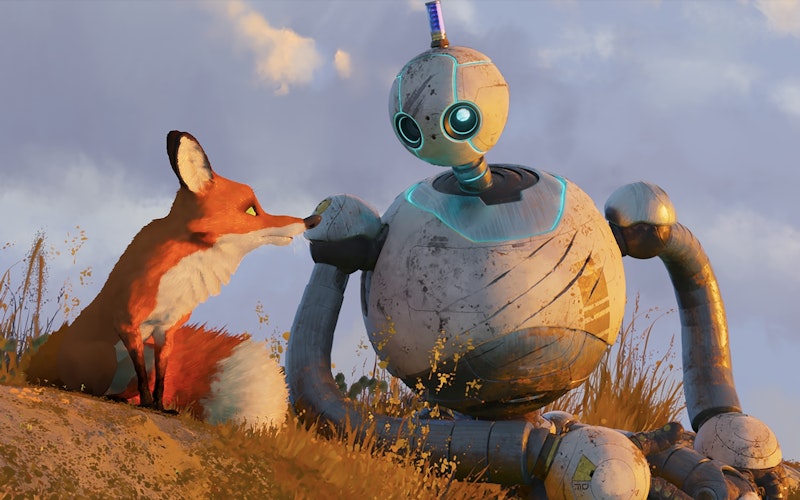
Movies
Wild Robot’s Christlike Counterprogramming
This past weekend, The Wild Robot hit theaters to near universal acclaim—and the movie deserves it. I expected a moving picture, but what I didn’t expect to encounter were robust metaphysical claims about our fallen condition and the Christlike power of love.
Based on the children’s novel by author and illustrator Peter Brown, the beautifully animated film centers on a robot, ROZZUM Unit 7134, better known as Roz (voiced by Lupita Nyong’o). Roz ends up shipwrecked on a wilderness island, where she finds herself mothering a gosling, Brightbill (Kit Connor), who has imprinted on her.
Roz’s plight centers on the fact that she is programmed to perform certain tasks to perfection. When she first encounters the animals of the island, she awards them “future customer” stickers and asks them for a job to complete. The results are catastrophic, given her unfamiliarity with the natural world. She winds up becoming known as “the monster” to all the animals on the island. Her lone friend is a fox named Fink (Pedro Pascal), who helps her raise Brightbill.
At first, Roz complains about this task of raising an orphaned gosling. “I do not have the programming,” she says of becoming a mother—a sentiment that basically every parent can relate to. Parent or not, all of us can relate to Roz’s feeling of being “programmed” in a way that feels limited. This makes her a walking metaphor for our fallen condition as fallible humans.
Just as Roz’s programming makes her captive to capitalist notions of productivity—she literally lives to work—our programming as humans has, since the Fall, been flawed. Created good, we seek out that which will most harm us. James 4 puts it this way: “What causes fights and quarrels among you? Don’t they come from your desires that battle within you? You desire but do not have, so you kill. You covet but you cannot get what you want, so you quarrel and fight. You do not have because you do not ask God.”
Roz reckons with what it means to find salvation from this fallen state. When, later in the film, she is confronted by another robot about how she found a task when there was no one to assign it, she remarks, “I have been overriding my programming from almost the moment I arrived.” As humans, overriding our programming is only possible through a force that is bigger than us. It is Jesus’ sacrifice that opens the door for us to have a relationship with God, and it is through that sacrifice that we are able to move beyond our sinful natures and pursue holiness.
Roz reckons with what it means to find salvation from a fallen state.
In The Wild Robot, sacrifice is a pervading theme. Like any parent, Roz sacrifices aspects of herself in order to raise Brightbill, something made literal in the scene in which she helps him learn how to fly. As Roz runs with Brightbill perched on her shoulder, trying to reach the velocity needed for flight, she repeatedly stumbles and falls, injuring herself so that some of her mechanical fluid spills to the ground. The stunning animation lingers on a patch of green liquid, giving audiences a concrete image of what sacrifice looks like. Indeed, it is Roz’s repeated sacrifice on behalf of the animals on the island that not only earns their respect, but also allows them to see a path outside of their most base instincts: kill or be killed. It is through Roz that a new door opens on the island, one that leads to community, where before there was only the desperate struggle for individual survival.
Roz’s Christlikeness doesn’t end there. She explicitly names love as the force that allows her to make those sacrifices. When she faces a cruel enemy later on in the movie and appears to be shut down, love allows her memories to miraculously survive. Love makes Roz into something different than she was before; it anchors what could be called her soul to something bigger than her. Even if the movie pauses before naming what this entity is, its metaphysical claims are nevertheless bold.
We too have the capacity to counter our fallen programming by accepting the gracious love of God, which leads to a flourishing community. Like Roz, that journey is not easy. We wound one another often, but we also have something within us that yearns for community. There is a part of us that is ever-reaching for eternity, even if that desire can become obscured by the daily concerns of work, parenting, or the pursuit of pleasure. For Roz and the animals she befriends, “kindness is a survival skill.” We might not be robots, but we have programming all the same. The trick is to accept the gift of salvation, which allows us to override it.
_______________
At Think Christian, we encourage careful cultural discernment. We recognize and respect that many Christians choose not to engage with pop culture that contains particular content, such as abuse, sex, violence, alcohol or drug use, or that employs the use of coarse language. To that end, we suggest visiting Common Sense Media for detailed information regarding the content of the particular pieces of pop culture discussed in this article.
Topics: Movies